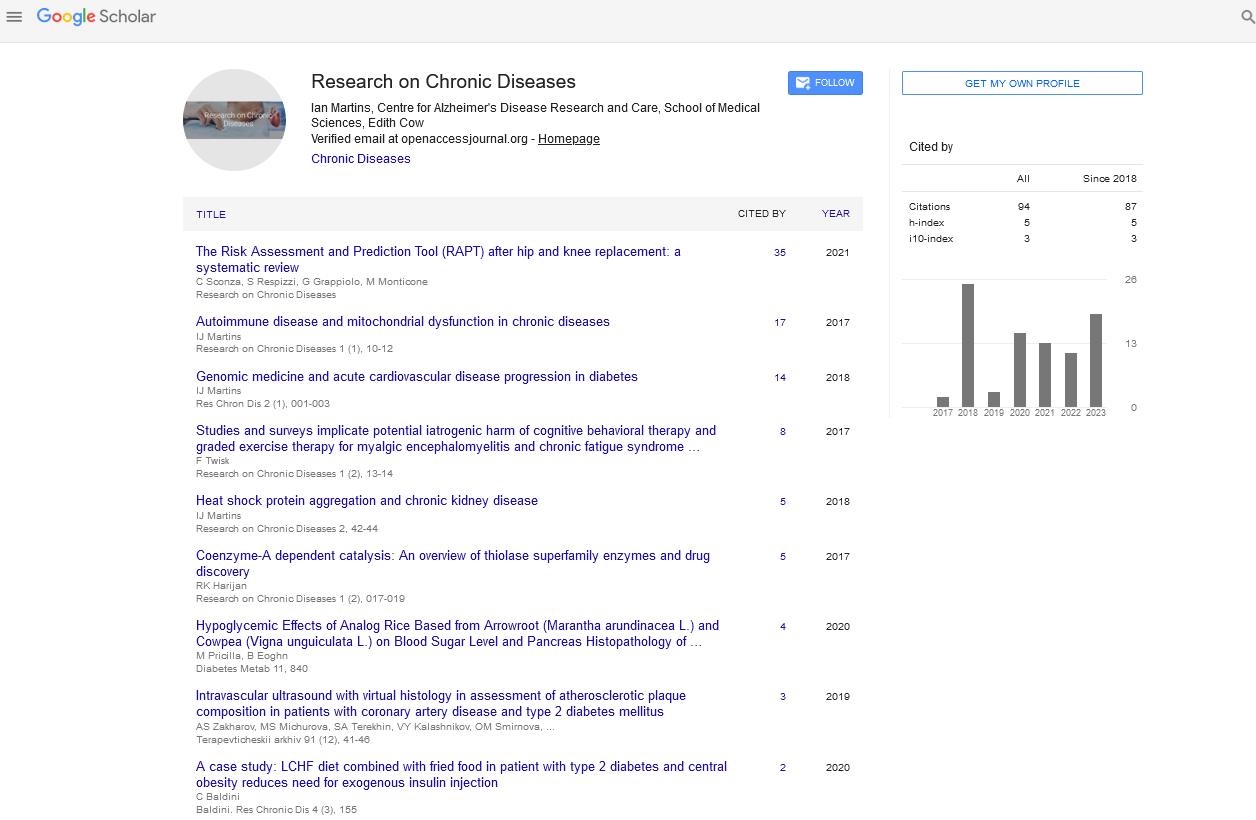Perspective - Research on Chronic Diseases (2024) Volume 8, Issue 3
Navigating the Waters of Chronic Renal Failure: Understanding, Managing, and Thriving Amidst the Challenges
- Corresponding Author:
- Tolga Saruhan
Department of Nephrology,
Farhan University,
Kathmandu,
Nepal
E-mail: tolgasaruha@gmail.com
Received: 04-May-2024, Manuscript No. oarcd-24-134040; Editor assigned: 08-May-2024, PreQC No. oarcd-24-134040 (PQ); Reviewed: 22-May-2024, QC No. oarcd-24-134040; Revised: 07-Jun-2024, Manuscript No. oarcd-24-134040 (R); Published: 14-Jun-2024, DOI: 10.37532/OARCD.2024.8(3).188-189
Introduction
Chronic renal failure, a formidable adversary silently affecting millions worldwide, casts a long shadow over the lives of those afflicted. This condition, characterized by the gradual loss of kidney function over time, poses significant challenges to health, well-being and quality of life. From the subtle onset of symptoms to the profound impact on daily activities, chronic renal failure demands a comprehensive approach to understanding, managing and ultimately thriving despite its formidable presence. In this article, we embark on a journey through the complex terrain of chronic renal failure, shedding light on its underlying causes, clinical manifestations, diagnostic approaches, treatment modalities and strategies for empowerment and resilience.
Description
Understanding chronic renal failure
Chronic renal failure, also known as Chronic Kidney Disease (CKD), encompasses a spectrum of progressive kidney damage and decline in renal function over time. This condition may result from a variety of underlying etiologies, including diabetes mellitus, hypertension, glomerulonephritis, polycystic kidney disease, autoimmune disorders and chronic urinary tract obstruction. As renal function declines, the kidneys lose their ability to effectively filter waste products and regulate fluid and electrolyte balance, leading to the accumulation of toxins, electrolyte imbalances, and disturbances in blood pressure and volume homeostasis.
Stages and progression
Chronic renal failure is classified into five stages based on the estimated Glomerular Filtration Rate (eGFR), which measures the rate at which the kidneys filter blood. In the early stages (stages 1-3), kidney damage may be present without significant symptoms and interventions aimed at slowing disease progression and managing comorbid conditions are paramount. As the disease advances (stages 4-5), kidney function declines further, necessitating closer monitoring, dietary restrictions and consideration of renal replacement therapy options, including dialysis or kidney transplantation.
Clinical manifestations
The clinical manifestations of chronic renal failure are diverse and may vary depending on the stage of the disease, underlying cause and individual patient factors. Early stages of CKD may be asymptomatic or present with nonspecific symptoms such as fatigue, weakness and mild fluid retention. As kidney function declines, however, symptoms may become more pronounced and include edema (swelling), hypertension, proteinuria (protein in the urine), hematuria (blood in the urine), nocturia (excessive urination at night), anemia, bone mineral disorders and cardiovascular complications such as heart failure and arrhythmias. In advanced stages, uremic symptoms may develop, including nausea, vomiting, pruritus (itching), neurological symptoms and metabolic disturbances, reflecting the systemic impact of kidney failure on multiple organ systems.
Diagnostic approaches
The diagnosis of chronic renal failure relies on a combination of clinical assessment, laboratory tests and imaging studies to evaluate kidney function, assess disease severity and identify underlying etiologies. Key laboratory tests include serum creatinine, Blood Urea Nitrogen (BUN), Estimated Glomerular Filtration Rate (eGFR), urine Albumin-To-Creatinine Ratio (ACR) and electrolyte levels. Imaging studies such as renal ultrasound, CT scan or MRI may be utilized to assess kidney size, structure and presence of abnormalities such as cysts or obstruction. Additionally, renal biopsy may be performed in certain cases to obtain tissue samples for histological examination and definitive diagnosis.
Treatment modalities
The management of chronic renal failure is multifaceted and encompasses a combination of lifestyle modifications, pharmacological interventions and renal replacement therapies aimed at preserving kidney function, managing complications and improving quality of life. Lifestyle modifications may include dietary modifications to restrict sodium, potassium and phosphorus intake, as well as smoking cessation, weight management and regular exercise to optimize cardiovascular health. Pharmacological interventions may include medications to control blood pressure, manage anemia and treat complications such as hyperkalemia or metabolic acidosis. In advanced stages of CKD, renal replacement therapy options such as hemodialysis, peritoneal dialysis or kidney transplantation may be necessary to sustain life and restore quality of life.
Empowerment and resilience
Living with chronic renal failure requires resilience, adaptability and a proactive approach to self-care. Empowering individuals with knowledge about their condition, treatment options and selfmanagement strategies is paramount in promoting autonomy and improving outcomes. Engaging in shared decision-making with healthcare providers, participating in support groups and seeking social support from peers, family and friends can provide valuable emotional and practical support in navigating the challenges posed by chronic renal failure. Additionally, cultivating a positive mindset, practicing mindfulness and stress-reduction techniques and focusing on activities and hobbies that bring joy and fulfillment can help individuals maintain a sense of purpose and resilience despite the uncertainties and complexities of living with chronic kidney disease.
Conclusion
Chronic renal failure represents a significant public health challenge, affecting millions of individuals worldwide and posing formidable challenges to health, well-being and quality of life. By gaining a deeper understanding of the underlying mechanisms, clinical manifestations, diagnostic approaches and treatment modalities for this condition, we can better equip ourselves to address the complex needs of affected individuals and optimize outcomes. Moreover, by fostering resilience, promoting self-care and embracing a multidisciplinary approach to management, we can empower individuals living with chronic renal failure to navigate the waters of their condition with courage, grace and resilience. Together, let us stand united in our commitment to raising awareness, advancing research and improving the lives of those affected by chronic renal failure.
